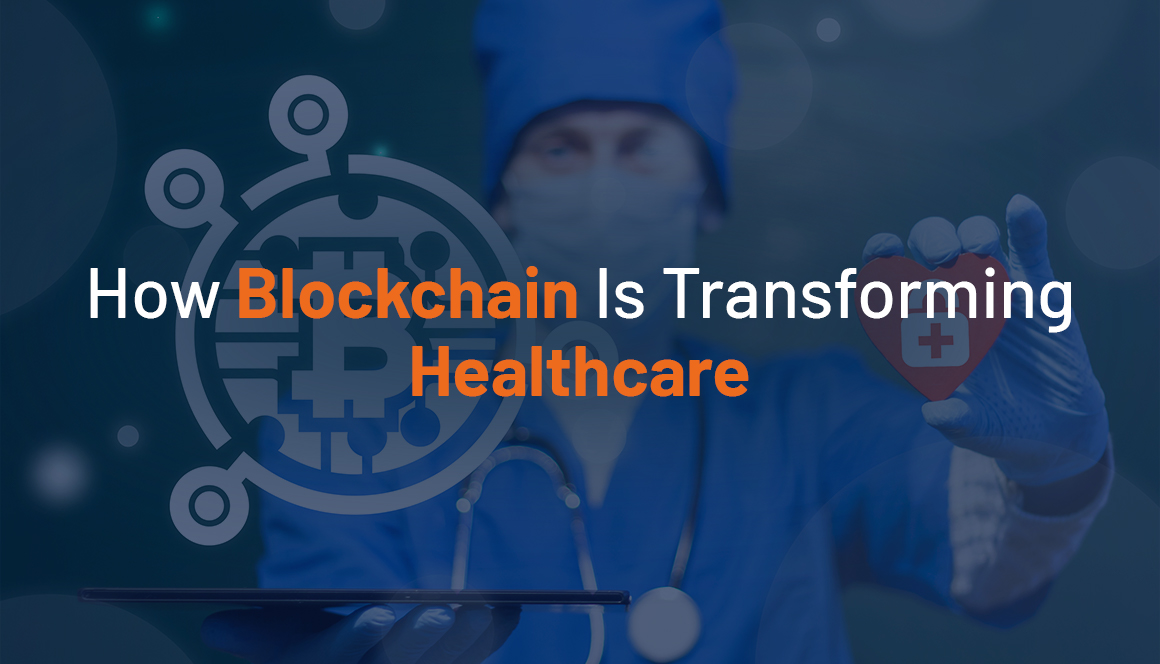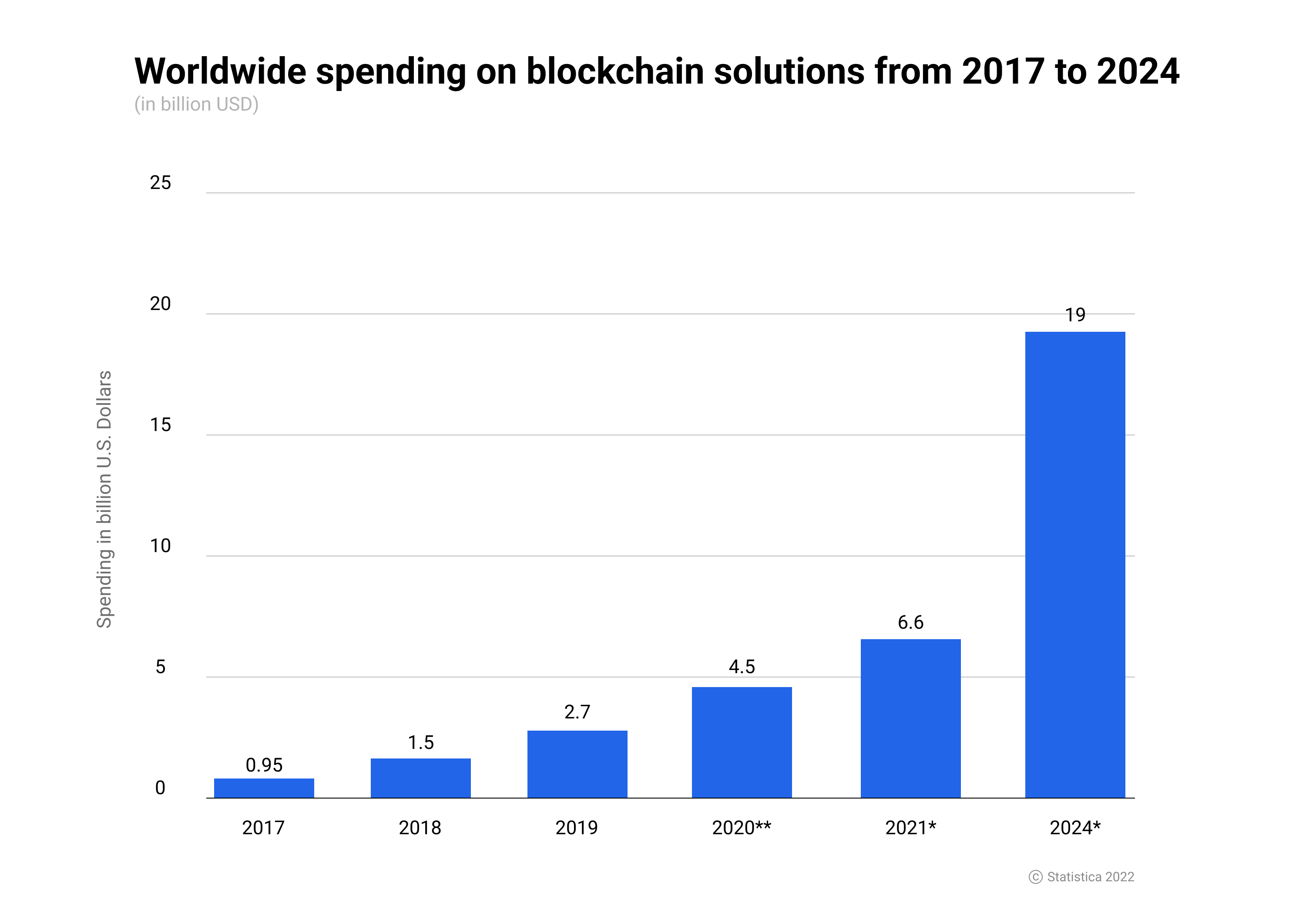
Here’s what you will learn:
Healthcare providers and consumers alike have benefitted immensely from the rapid progress in software-based technologies. With the medical-care industry inching swiftly toward digitization and customization, the dominance of blockchains seems imminent.
And it’s not just healthcare, though. Blockchain’s abilities have made it a highly successful technology across different industrial domains. The emergence of blockchain came with solutions to address multiple issues prevailing for so long in the healthcare industry. The increasing incidences of data breaches, privacy issues, among others, are the key factors driving the Blockchain market’s growth in telemedicine. The global blockchain development revenue in telemedicine will reach $829 million by 2023, according to a survey by Markets And Markets.
Using blockchain, telemedicine providers can offer seamless information flow, data security, agility. Telemedicine was evolving, slowly. Covid-19 provided an unprecedented impetus. With lockdowns and restrictions, doctors and patients were forced to adopt virtual healthcare. The telemedicine market has seen tremendous growth in the past year. The telemedicine market was valued at around $45 billion in 2019 per a Statista analysis. It is forecast to grow nearly four times by 2026. This growth will be strengthened by several significant factors like increased in-person treatment costs, telemedicine funds, and prominent growth in the number of digital health users.
Table of Contents
Telemedicine’s Evolution Driven by Blockchain
Decentralization was a big challenge for the healthcare industry until Blockchain integration came into the picture. Centralized systems always run the risk of a single point of failure and are vulnerable to data breaches, impacting system reliability. Blockchain technology effectively resolved such challenges. To manage the ledger of health records, it implements a distributed architecture. Every node connected syncs and verifies all the ledger copies.
Among the key concerns addressed by Blockchain are tracing pharmaceuticals and drugs across the supply chain, securing data privacy, tracking patients’ locations, and verifying physicians’ credentials.
How Blockchains Accelerate Innovations in Telemedicine
-
Patient Consent Management
Several challenges are associated with the conventional consent management approach, such as limited trust on third-party servers, inability to perform fair audit trails, and many more. Blockchain resolves these challenges and assists telemedicine applications to build trust. Moreover, Blockchain assists in performing audit trials to verify compliance with consent management policies.
-
Remote Treatment Traceability
For efficient remote treatment, a face-to-face discussion with patients and doctors is essential. Telemedicine services apply direct-to-consumer and business-to-business models. In this model, caregivers participate in the consultation using tools that support video and audio conferencing. Moreover, Blockchain supports telemedicine applications to offer a single electronic records view for all participating stakeholders. Transparency assists in tracking the medical history of patients to provide relevant treatment.
-
Traceability of Medical Devices
The use of medical kits and devices at home was considered less reliable by physicians because of the lack of data about the provenance of medical equipment. Blockchain addressed this concern by providing completely immutable record transactions to the ownership and performance of testing kits on the distributed ledger. Reputation scores of all medical gadgets and test kits are recorded using smart contracts.
-
Automated Payments
Blockchain supports digitally signed payments to guarantee secure transactions. In comparison to centralized systems, Blockchain does not involve any third-party services for payments. In this way, Blockchain gains the trust of patients and supports micropayments by offering cryptocurrency payments. The direct transfer of crypto enhances the system into a more secure, fast, and transparent approach.
Seeing these opportunities, a growing number of healthcare companies are taking a keen interest to invest in blockchain development services for long-term business advantages.
Top Benefits of Blockchain in Telemedicine
Secure Data Sharing
Blockchain supports sharing of data in a secured encrypted manner. Both patients and doctors can smoothly exchange personal data of the ledger; no single party will have full access to the data.
Advanced Healthcare Services
Healthcare services, including remote patient monitoring, distant treatment, auto payments, insurance services, and efficient data management, Blockchain development aim to improve healthcare services.
Improved Data Management
The Blockchain-based healthcare system aids doctors, patients, and healthcare workers. They can freely manage highly confidential patient information in the most cost-effective, secure, and transparent way.
Transparency
Blockchain’s accuracy and transparency are unrivaled. With the introduction of Blockchain in telemedicine, the cases of insurance fraud and data breaches have significantly reduced. Moreover, the decentralized nature of Blockchain and the use of smart contracts have also contributed to increasing the network’s transparency.
Wrapping Up
Blockchain plays a key role in securing health records, remote patient treatment, monitoring, avoiding frauds, and securing payments, among others. Health-tech experts say that brands consulting with a blockchain development company will have competitive advantages in the future. The way patients & doctors connect, pass the information, share health records, and perform every other digital activity is becoming more secure by Blockchain.
FAQs
- What is Blockchain technology good for?
By spreading its operations across a range of industries, Blockchain allows Bitcoin and other crypto-currencies to operate without the need for a centralized authority. This not only reduces risk but also improves telemedicine sector.
- What are the main features of Blockchain technology?
Data stored in the Blockchain is made secure and immutable using cryptography. Every block is referenced by a unique string of characters, generated by a cryptographic hash function. This function can accept any amount of data as inputs and generate a fixed-length string as output.
- What is Blockchain app development?
A blockchain is a decentralized digital ledger that saves transactions on thousands of computers around the globe. Blockchain technology increases the security and speeds up the exchange of information in a way that is cost-effective and more transparent.
- What is the cost of Blockchain app development?
The cost of Blockchain app development depends on the size, features and functionality of the app. Estimating cost initially is not possible before analyzing the overall requirements and complexity of the app.
- How we create a Blockchain app for client?
Step 1: Clarify your idea.
Step 2: Do competitor research.
Step 3: Analyze your options.
Step 4: Choose a platform.
Step 5: Start the development process.
Step 5: Deploy and maintain your App.



